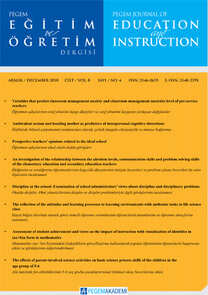Prediction of students' strategies for doing science homework by parental support and students' goal orientation
Öğrencilerin fen bilimleri ödevlerinde kullandıkları stratejilerin aile desteği ve öğrencilerin hedef yönelimleri yardımıyla yordanması
___
Ames, C. (1992). Classrooms: Goals, structures, and student motivation. Journal of Educational Psychology, 84, 261–271.Brislin, R. W., Lonner, W. J. & Thorndıke, R. M. (1973). Cross-cultural research methods, New York: John Willey.
Conroy, D. E. & Elliot, A. J., (2004). Fear of failure and achievement goals in sport: Adressing the issue of the chicken and the egg. Anxiety, Stress, and Coping, 17 (3), 271-285.
Covington, M. V. (1985). Strategic thinking and the fear of failure. In J. W. Segal, S. F. Chipman ve R. Glaser (Eds.), Thinking and learning skills (pp. 398–416). Hillsdale: Erlbaum.
Dupeyrat, C. & Martiné, C. (2005). Implicit theories of intelligence, goal orientation, cognitive engagement, and achievement: a test of Dweck’s model with returning to school adults. Contemporary Educational Psychology, 30, 43–59.
Elliot, A. J. & Church, M. A. (1997). A hierarchical model of approach and avoidance achievement motivation. Journal of Personality and Social Psychology, 72, 218-232
Elliot, A. J. & McGregor, H. A. (2001). A 2X2 achievement goal framework. Journal of Personality and Social Psychology, 80, 501–519.
Elliot, A. J. & Murayama, K. (2008). On the measurement of achievement goals: Critique, illustration, and application. Journal of Educational Psychology, 100, 613-628.
Field, A. (2009). Discovering statistics using SPSS. (3rd Ed). Thousand Oaks, CA: Sage.
Friedel, J. M., Cortina, K. S., Turner, J. C. & Midgley, C. (2007). Achievement goals, efficacy beliefs and coping strategies in mathematics: The roles of perceived parent and teacher goal emphases. Contemporary Educational Psychology, 32 (3), 434-458.
Kahraman, N. (2011). Antecedents and consequences of achievement goals. Unpublished doctorate dissertation, Middle East Technical University, Turkey.
Kahraman, N. & Sungur, S. (2011). The contribution of motivational beliefs to students’ metacognitive strategy use. Education and Science, 36 (160), 3-10.
Küçükahmet, L. (2004). Öğretimde planlama ve değerlendirme. Ankara: Nobel Basımevi.
Lee, V. E. (2000). Using hierarchical linear modeling to study social context: The case of school effects. Educational Psychologist, 35, 125–141.
McElhaney, K. B. & Allen, J. P. (2001). Autonomy and adolescent social functioning: The moderating effect of risk. Child Development, 72 (1), 220–235.
McKenzie, K., Gow, K. & Schweitzer, R. (2004). Exploring first-year academic achievement through structural equation modelling. Higher Education Research and Development, 23, 95–112.
Midgley, C. & Urdan, T. (2001). Academic self-handicapping and achievement goals: A further examination. Contemporary Educational Psychology, 26, 61-75.
Nien, C. & Duda, J., L. (2008). Antecedents and consequences of approach and avoidance achievement goals: A test of gender invariance. Psychology of Sport and Exercise, 9 (3), 352- 372.
Oğuzkan, F. (1985). Orta dereceli okullarda öğretim. Emel Matbaacılık: Ankara.
Olausen, B. S. & Bräten, I. (1999). Students’ use of strategies for self-regulated learning: cross-cultural perspectives. Scandinavian Journal of Educational Research, 43, 409–431.
Pintrich, P. R. (2000a). An achievement goal theory perspective on issues in motivation terminology, theory, and research. Contemporary Educational Psychology, 25, 92-104.
Pintrich, P. R. (2000b). Multiple goals, multiple pathways: The role of goal orientation in learning and achievement. Journal of Educational Psychology, 92, 544-555.
Ramdass, D. & Zimmerman, B. J. (2011). Developing self-regulation skills: The important role of homework. Journal of Advanced Academics, 22 (2), 194-218.
Raudenbush, S. W. & Bryk, A. S. (2002). Hierarchical linear model: Applications and data analysis method. Thousand Oaks, CA: Sage.
Tabachnick, B. G. & Fidell, L. S. (2001). Using multivariate statistics (4th Ed.). Needham Heights, MA: Allyn and Bacon.
Tas, Y., Sungur, S. & Oztekin, C. (2016). Development and validation of science homework scale for middle school students. International Journal of Science and Mathematics Education, 14 (3), 417- 444.
Trivette, P. & Anderson, E. (1995). The effects of four components of parental involvement on eightgrade student achievement: structural analysis of nels-88 data. School Psychology Review, 24 (2), 51- 59.
Winne, P. H. (2001). Self-regulated learning viewed from models of information processing. In B. J. Zimmerman ve D. H. Schunk (Eds.), Self-regulated learning and academic achievement: Theoretical perspectives (pp. 153–189). Mahwah: Erlbaum.
Wolters, C. A. (2003). Regulation of motivation: evaluating an underemphasized aspect of self-regulated learning. Educational Psychologist, 38, 189–205.
Wolters, C. A., Yu, S. L. & Pintrich, P. R. (1996). The relation between goal orientation and students’ motivational beliefs and self-regulated learning. Learning and Individual Differences, 8, 211-238.
Xu, J. (2004). Parent help and homework management in urban and rural secondary schools. Teachers College Record, 106, 1786–1803.
Xu, J. (2005). Purposes for doing homework reported by middle and high school students. The Journal of Educational Research, 99, 46-55.
Xu, J. (2008a). Validation of scores on the homework management scale for middle school students. The Elementary School Journal, 109 (1), 82-95.
Xu, J. (2008b). Models of secondary school students’ interest in homework: A multilevel analysis. American Educational Research Journal, 45 (4), 1180-1205.
Xu, J. (2010). Predicting homework time management at the secondary school level: A multilevel analysis. Learning and Individual Differences, 20 (1), 34-39.
Xu, J., Fan, X., Du, J. & He, M. (2017). A study of the validity and reliability of the parental homework support scale. Measurement, 95, 93-98.
Xu, J. & Wu, H. (2013). Self-regulation of homework behavior: homework management at the secondary school level. The Journal of Educational Research, 106 (1), 1-13.
Zimmerman, B. J. & Schunk, D. H. (2001). Self-regulated learning and academic achievement: Theoretical perspectives. Mahwah: Erlbaum.
- ISSN: 2146-0655
- Yayın Aralığı: 4
- Başlangıç: 2011
- Yayıncı: Pegem Akademi Yayıncılık Eğitim Danışmanlık Hizmetleri Tic. Ltd. Şti.
Hatice Cemre DAĞGÜL, Ayşe IŞIK GÜRŞİMŞEK
Ali İbrahim Can GÖZÜM, Adalet KANDIR
ESEN TURAN ÖZPOLAT, GÜLDEN GÜRSOY
Okul öncesi dönemde dikkat yetisinin gelişimi programının çocukların dikkat yetisi kazanımına etkisi
Ali İbrahim Can GÖZÜM, Adalet KANDIR
Esra ÖMEROĞLU, H. Elif DAĞLIĞLU, Aysun TURUPCU DOĞAN, Volkan KUKUL, Serçin KARATAŞ, Safiye SARICI BULUT, Osman SABANCI, M. Gülşah ŞAHİN, Ebru KILIÇ ÇAKMAK
